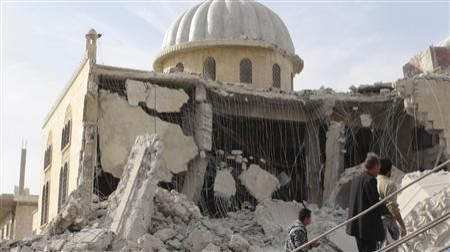Syrian Rebels Shift Strategy, Say 'Zero Hour' Is Near

DAMASCUS -- In the past few days, rebels have attacked a military airport, an intelligence compound and several bastions of regime henchmen and military personnel in and around Damascus. Activists say these coordinated attacks have killed approximately 120.
Perhaps in the most symbolic victory yet, rebels have also managed on Wednesday to land at least one mortar shell inside the grounds of the Presidential Palace, located on the hills of Damascus. No damage or casualties were reported. It is also unlikely that Syria’s President Bashar al Assad still resides there, as his current whereabouts are unknown.
“We’re targeting sensitive areas to weaken the regime. This is all part of a new strategy that we’re now applying to Damascus and throughout the southern command,” Damascus-based activist Rami al Sayyed said. “The old strategy is out.”
Al Sayyed was referring to the rebels’ now year-old tactic of attacking military posts or buildings associated with the regime, such as police stations, in a particular area before claiming it “liberated.” This has been the rebels’ modus operandi as they gained ground throughout the country’s north, as well as in the embattled cities of Homs and Aleppo.
But these tactics have invited aerial bombardment from regime forces, whose soldiers find it increasingly difficult to penetrate the so-called liberated areas on foot. This cat-and-mouse game has sometimes backfired against the rebels, because residents in those neighborhoods have ended up losing their homes, and sometimes their lives, in the backlash attacks. It is not uncommon to hear resentful residents blame the rebels for “inviting trouble” to embattled neighborhoods.
Zero Hour
The head of the Revolutionary Military Council and Southern Command, Colonel Ahmad Nemeh, also reiterated on Wednesday this shift in strategy during interviews with Arabic news channels. He confirmed that battalions in and around Damascus and throughout the southern front have united together to execute this new directive. He added that the rebels have the weapons and the expertise to see this through.
“It won’t be a matter of months but weeks for Zero Hour. That’s how much longer we expect before we take over Damascus and raise the revolutionary flag in the Presidential Palace,” he added.
In another apparent escalation of targeted attacks, there were in the past few days three political assassinations of pro-regime figures.
The SANA state news agency said a "terrorist group" detonated a car bomb on Wednesday by remote control, killing Judge Abad Nadhwah. The Syrian government usually refers to rebels as "terrorists."
On Tuesday, a gunman on motorcycle shot dead the brother of Syria's parliament speaker.
On Sunday, a prominent actor who was an outspoken supporter of Assad and accused by some dissidents of being a government informant, was found dead in front of his home. The family of Mohammed Rafeh said his body bore gunshot wounds to the head, neck and shoulder. His funeral was attended by dozens of officials, some in uniform.
The government already seems to be reacting to the stepped-up rebel offensives. Late Sunday night, hundreds of government troops could be seen withdrawing from Homs and heading toward Damascus in what activists are calling a regime scramble to boost defenses in the capital.
The Assad regime also seems to have launched its fiercest offensive yet against the capital, with massive shelling and aerial bombardment simultaneously in at least half a dozen locations in and around Damascus.
Fighter Jets Over Damascus
The sound of fighter jets and helicopters could be heard everywhere in the capital, followed by explosions of the bombs dropped on restive areas. Schools were canceled on Wednesday, and many Damascus residents agree that the past few days have been unusually tense. After dark, periodic shelling around the city could also be heard.
Activists also said that the regime dropped cluster bombs on Wednesday on the Damascus neighborhood of al Hajar al Aswad, in what might be the first-time use of the weapons for the capital. The regime has been known to use the controversial submunition in other parts of Syria during the 19-month conflict, in cases that are well documented by Human Rights Watch and other international watchdogs.
The past couple of days have also seen some high-profile defections from the military, including several high-level military officers and pilots, one of them with the same last name as Syria’s president. Activists say he is a member of the Assad family, though that could not be independently verified.
U.S. Secretary of State Hillary Clinton, whose administration has just won a second term in office, has been leading an effort to unite the Syrian opposition, whose members will meet in Doha, Qatar, on Thursday.
The rebel offensive also comes on the heels of Turkey's announcement that it will request NATO to set up missiles along Turkey’s Syrian border. The aim is to protect some of the rebel-held areas inside Syria against Assad regime’s aerial bombardment.
© Copyright IBTimes 2024. All rights reserved.




















